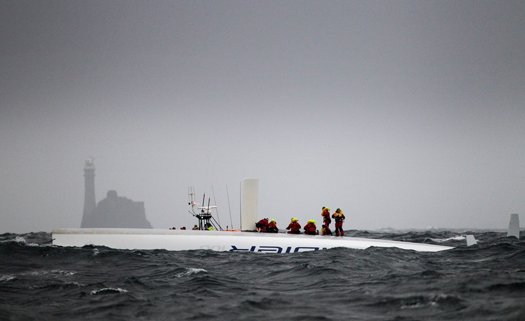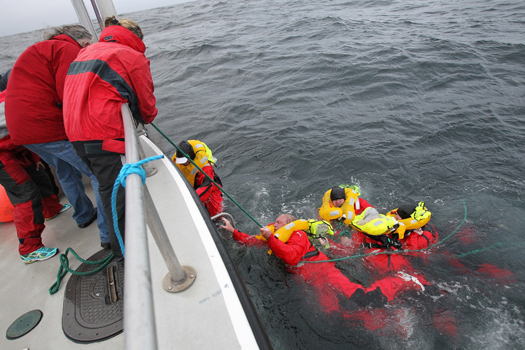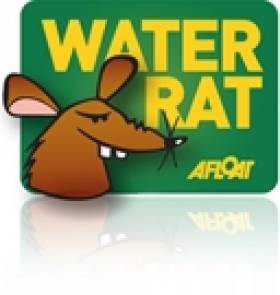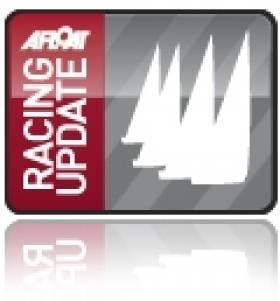Displaying items by tag: hospital
While it might be an exaggeration to say that all of the 21 crew members of Rambler 100 owe their lives to the Irish Search and Rescue service, there are certainly five people whose future prospects were greatly improved by the operation off the Fastnet Rock on August 15th. A lot of media focus has been on Coxswain Kieran Cotter and the crew of Baltimore Lifeboat as well as lifeboat mechanic Jerry Smith, whose dive boat, on charter to the media team of one of the competitors, was on hand to search and recover the five drifting crew. There is no question that this focus is appropriate. RNLI crews all over the UK and Ireland deserve the attention, not only because of their extraordinary voluntary dedication to the cause, but also because such publicity helps swell the coffers of the charity. The service could not operate without the generosity of the donors and incidents such as these help fill the blue boat-shaped boxes held by even more RNLI volunteers.

Saved: Ireland's Rescue Services Answered the Call of the capsized Supermaxi Rambler 100 off the Fastnet Rock. Photo: Team Phaedo
The dramatic stories and pictures dominating the media show the front line of a quite wonderful resource that is Search and Rescue in Ireland today. Baltimore Lifeboat was at the coal face of an intricate network of operations, triggered by the crew's EPIRBs. Irish Coast Guard radio officers in Valentia responded almost immediately tasking the rescue resources, working the phones and computers to confirm that this was not an accidentally triggered EPIRB, contacting RORC HQ, determining search patterns and relaying the information to the scene. It was the backroom contacts between RORC and the Coast Guard in endeavouring to contact Rambler 100 using satellite phones that confirmed the possibility of a catastrophic incident involving the Supermaxi. The subsequent tasking of the Shannon and Waterford based Sikorsky helicopters led to the medevac of crew member Wendy Touton and timely treatment of her hypothermic condition, initially by the on-board paramedics and later at Tralee General hospital. And Coast Guard involvement didn't end with the successful rescue – the shoreside operation to provide food and shelter in Baltimore was coordinated by Coast Guard personnel and the salvage operation of the hull of Rambler 100 was overseen by the Irish Coast Guard.

Rambler crew are recovered from the water after a SAR operation by the Irish Coastguard Photo: Team Phaedo. More photos here.
That Ireland has probably one of the best Search and Rescue services in the world goes back to the campaign initiated in 1988 by Joan McGinley, following the death, within sight of land of Donegal fisherman John Oglesby, whose leg was severed in a trawl winch. Eamon Doherty, the late former Garda Commissioner chaired the review group established in response to the campaign and his report led to the establishment of the Irish Marine Emergency Service, subsequently the Irish Coast Guard. Under the guidance of Director Capt Liam Kirwan, the new service moved quickly to become not only the central co-ordinating body for Search and Rescue, but developed its own resources, notably the helicopters, previously tasked in from Irish Air Corps and UK SAR.
Another element that will feature in the Rambler 100 incident is the Marine Casualty Investigation Board (MCIB), set up from recommendations arising from a review of the handling of investigations into marine casualties.
It might be thought that the incident is now closed, but there are many unanswered questions and the investigation will be looking at these and making recommendations that should improve safety in this sector. These questions will include EPIRB performance, liferaft deployment and grab bag usage, but perhaps the key issue yet to be determined is why the response from fellow competitors didn't appear to happen. Even if Channel 16 wasn't being actively monitored, and if not why not, shouldn't the Mayday set off by the Coast Guard have set off the DSC alerts on the radios of Rambler 100's fellow competitors? Had the incident occurred several hours later or earlier when Rambler 100 could have been up to 100 miles from the nearest land, when conditions worsened, we could be looking at much more serious consequences.
It is heartening to think that, in this small country of ours in troubled times, not only do we have a shining star in our search, rescue, recovery and restore system, involving professionals and volunteers cooperating for the greater good, we also have a system that determines the nature of incidents so that we can all learn from the experience.
And let us not forget those people and services, such as the Gardai, Navy, Army and the community of Baltimore who are outside the media spotlight who contributed to this happy ending.
Afloat's Latest Coastguard News
Afloat's Latest RNLI Lifeboat News
Afloat's Latest MCIB News
A collision occurred on Saturday at Aberdeen Asset Management Cowes Week between the Class 4 boat Atalanta and an incoming tanker. SEE VIDEO BELOW.
One member of the crew was knocked overboard and is OK. A further crew member has been injured and has been taken to hospital but later discharged. An official investigation on the incident has been launched.
{youtube}L5Nrx3Mdzls{/youtube}
The footage, now on youtube, was taken by Tim Addison, who was filming racing for cowes.co.uk, the website of the Cowes Harbour Commission.
A Maritime and Coastguard Agency (MCA) spokesman said: 'Two people were thrown overboard by the collision. The Marine Accident Investigation Branch and the MCA duty surveyor have been informed. The tanker continued to its destination at Fawley and the yacht has been towed to the UKSA berths at Cowes.'The Rhib (rigid-hulled inflatable boat) Vigilant took one of the crew back to shore for medical attention whilst the Southampton Patrol Boat and Hamble Rescue took the second crew member who had suffered a gash to his head to a waiting ambulance at Trinity Pontoon for transport to Newport Hospital. He was later reported to have been discharged.































































